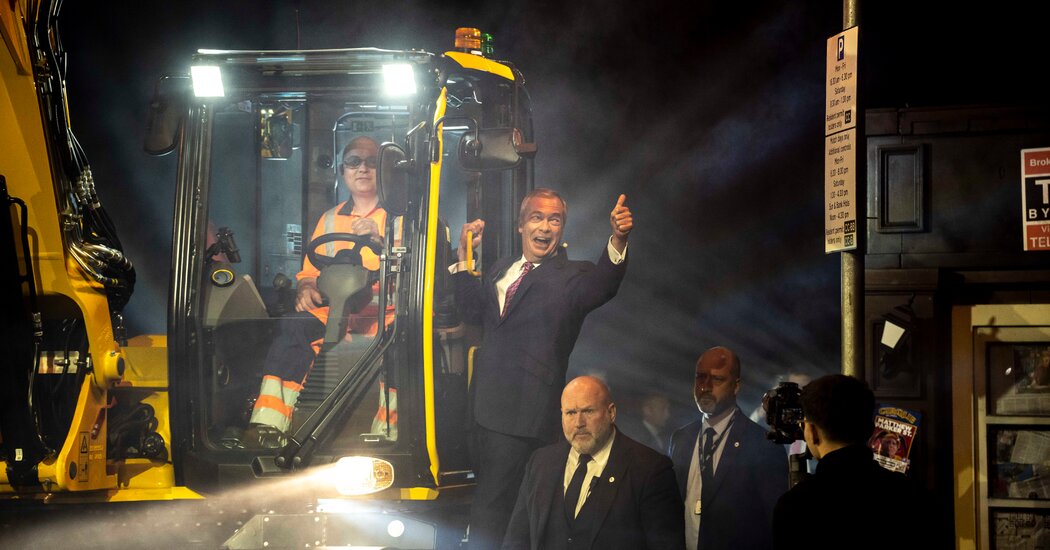The pulsing beat of a dance track grew to a thunderous pitch and the crowd rose to its feet. Beams of light flashed across the cavernous arena in Birmingham, central England. Then, at last, Nigel Farage, the right-wing populist leader who claims he can fix a “broken Britain,” arrived onstage, hitching a ride on a backhoe.
Mr. Farage, who leads the anti-immigration party Reform U.K., has long been one of Britain’s most ardent supporters of President Trump. He has learned from the president’s campaign tactics, too.
That means, among other things, that the political rally is back in Britain.
In the weeks before municipal elections and a special election in England on May 1, Mr. Farage has been touring the country, taking to the stage in Cornwall, Darlington and Hull, smiling broadly, cracking jokes and railing against “illegal immigrants,” whom he promises to deport.
Since returning to the leadership of Reform last year and then being elected as a British lawmaker for the first time, Mr. Farage has led the insurgent party to an extraordinary surge in the polls. It won 14 percent of the vote last July, but now regularly polls at around 25 percent, overtaking the main opposition Conservatives and, in some surveys, the governing Labour Party.
Thursday’s elections, while limited in number, are the first test of Reform’s ability to convert that polling into power. Analysts expect the party to emerge with hundreds of municipal seats and two regional mayors. It’s also favored to win a closely fought special election for a parliamentary seat the same night.
Mr. Farage is a charismatic, fluent speaker who, like Mr. Trump, embraces an “us-versus-them” rhetoric when it comes to undocumented immigrants and other political parties. His rallies stand out in a country where the bulk of politics long ago switched from public speechmaking to TV and now social media.
British politicians tend to address large crowds now only during election campaigns or at their annual party conferences. Jeremy Corbyn, the hard-left former leader of the Labour Party, was a notable exception in 2017 when he spoke at the Glastonbury music festival and was serenaded enthusiastically by concertgoers.
“Rallies have gone out of political fashion,” said Neil Kinnock, who led Labour from 1983 to 1992, and was one of the most accomplished orators of his era. He was famed for his platform speeches, including his 1983 warning against voting Conservative and his passionate denunciation of the hard left in 1985. He’s also cited in Britain as an example of oratory’s dangers: An arena rally he held before the 1992 election was seen by some critics as contributing to Labour’s defeat that year, though polling evidence contradicts the theory.
Mr. Kinnock is no fan of Mr. Farage’s speeches. “When I’m being condescending — sorry — I think of it as saloon bar chatter from behind a microphone,” he said. “But with the right audience it’s certainly effective.”
The Reform rally formula, Mr. Kinnock said, includes lots of noise, speakers to warm up the crowd, then “a Farage crescendo,” where the leader “is projected as a sort of Everyman Messiah.” The rallies are “not unlike Trump’s,” he noted, with “repetitive themes, some rambling, with phrases that the audience likes; references to immigration and its alleged consequences are unmissable.”
Mr. Trump’s MAGA events have sometimes drawn tens of thousands to big open-air venues. They feature a thumping soundtrack (“Y.M.C.A.,” by the Village People, is a standard), as well as provocative, crowd-pleasing moments, like when Mr. Trump points out the TV cameras and journalists at the back of the arena and labels them “fake news.”
Such theatrics played a critical role in Mr. Trump’s political rise, according to Stephen K. Bannon, who was chief executive of Mr. Trump’s 2016 campaign.
“When he came down that escalator in New York and went to Iowa two days later, we had nothing,” said Mr. Bannon, referring to June 2015, when Mr. Trump announced his candidacy. “The rallies became everything. The Trump campaign was essentially a series of rallies.”
After the Brexit vote in 2016, Mr. Bannon said the campaign recognized Mr. Farage’s value as a warm-up act. In August that year, Mr. Farage appeared alongside Mr. Trump at a MAGA rally in Jackson, Miss.
Brexit was Britain’s “Independence Day,” Mr. Farage declared, as Mr. Trump beamed and clapped.
“We drilled Brexit into people’s heads,” Mr. Bannon said. “By the time we had Nigel come over, he was a rock star among the MAGA faithful. You have to have someone with charisma. He’s also a fun guy, like Trump.”
At the event in Birmingham, Reform had built a stage set intended to symbolize a depleted nation, including a mound of trash bags (a clear reference to the city’s garbage strike), a bus stop covered in graffiti and a shuttered pub.
Mr. Farage attacked the government’s net zero targets and pledged that a Reform government would “get rid of the Human Rights Act” and deport undocumented migrants. “Let me tell you, everyone who comes illegally will be deported, end of story,” he said, to the loudest whoops and cheers of the night.
Birmingham was not — as had been promised — the largest political rally in modern British history. The party said it sold around 10,000 tickets but there were hundreds of empty seats. Yet by drawing thousands of people, some traveling hundreds of miles, to a political event, Mr. Farage achieved something no other British party has recently attempted.
He has already held rallies at critical moments of a long political career in which he has led three parties and campaigned for Brexit. In 2016, just before the referendum in which Britain voted to leave the European Union, Mr. Farage addressed supporters in Gateshead in northeastern England, holding up a placard reading: “We want our country back.”
Last year, his arrival at a rally in Clacton-on-Sea, which he now represents in Parliament, was marked by pyrotechnics and an Eminem song booming out: “Guess who’s back, back again?”
In the Birmingham arena, Caroline Woodman, 61, from Leigh on Sea, an Essex town more than two hours’ drive from the venue, said she wanted lower immigration, higher living standards and to “get rid of the wokeness.” Unable to work while she awaits a foot operation, Ms. Woodman, a teacher, said she was raised in a Labour-supporting family but has voted for Mr. Farage for more than two decades.
“I know he’s an honest, dutiful, kind person who would put our country first and he will look after the people,” she said.
Gary Jackson, 56, from east Yorkshire, is a retired police commander. He previously voted Conservative but now expects Mr. Farage to be the next prime minister. “I don’t know any other politician who answers as straight as he does,” he said.
Robert Hayward, a Conservative member of the House of Lords and a polling expert, said the rallies were galvanizing the supporters needed to build Reform U.K. into a nationwide party that could challenge Labour in 2028 or 2029, when Britain will next hold a general election.
“It establishes a sense of momentum by bringing all these people together,” said Mr. Hayward. “No other party at the moment could do anything like that.”


